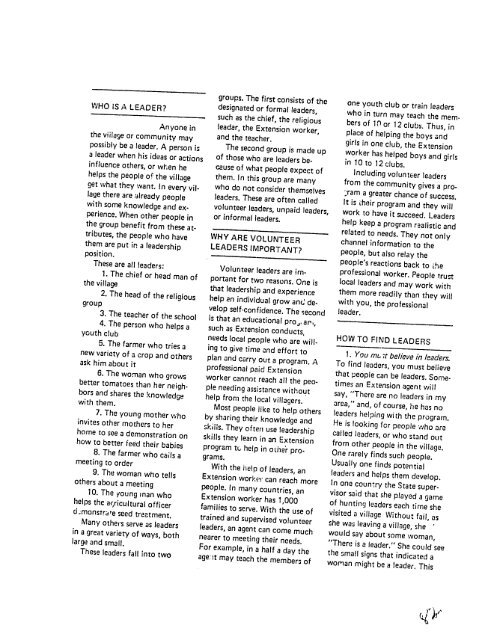Qn VATW Lk WAw LwUiWE WWW M - (PDF, 101 mb) - USAID
Qn VATW Lk WAw LwUiWE WWW M - (PDF, 101 mb) - USAID
Qn VATW Lk WAw LwUiWE WWW M - (PDF, 101 mb) - USAID
You also want an ePaper? Increase the reach of your titles
YUMPU automatically turns print PDFs into web optimized ePapers that Google loves.
WHO IS A LEADER?<br />
Anyone in<br />
the viilage or community may<br />
possibly be a leader. A person is<br />
a leader when his ideas or actions<br />
influence others, or when he<br />
helps the people of the village<br />
get what they want. In every village<br />
there are already people<br />
with some knowledge and experience.<br />
When other people in<br />
the group benefit from these attributes,<br />
the people who have<br />
them are put in a leadership<br />
position,<br />
These are all leaders:<br />
1. The chief or head man of<br />
the village<br />
2. The head of the religious<br />
group<br />
3. The teacher of the school<br />
4. The person who helps a<br />
youth club<br />
5. The farmer who tries a<br />
new variety of a crop and others<br />
ask him about it<br />
6. The woman who grows<br />
better tomatoes than her neighbors<br />
and shares the knowledge<br />
with them.<br />
7. The young mother who<br />
invites other mothers to her<br />
home to see a demonstration on<br />
how to better feed their babies<br />
8. The farmer who cails a<br />
meeting to order<br />
9. The woman who tells<br />
others about a meeting<br />
10. The young inan who<br />
helps the arricultural officer<br />
d..monstrate seed treatment,<br />
Many others serve as leaders<br />
in a great variety of ways, both<br />
large and small.<br />
These leaders fall into two<br />
groups. The first consists of the<br />
designated or formal leaders,<br />
such as the chief, the religious<br />
leader, the Extension worker,<br />
and the teacher.<br />
The second group is made up<br />
of those who are leaders because<br />
of what people expect of<br />
them. In this group are many<br />
who do not consider themselves<br />
leaders. These are often called<br />
volunteer leaders, unpaid leaders,<br />
or informal leaders.<br />
WHY ARE VOLUNTEER<br />
LEADERS IMPORTANT?<br />
Volunteer leaders are im.<br />
portant for two reasons. One is<br />
that leadership and experience<br />
help an individual grow and de.<br />
velop self-confidence. The second<br />
is that an educational pro, a,,<br />
such as Extension conducts,<br />
needs local people who are will.<br />
ing to give time and effort to<br />
plan and carry out a program. A<br />
professional paid Extension<br />
worker cannot reach all the peopie<br />
needing assistance without<br />
help from the local villagers,<br />
Most people like to help others<br />
by sharing their knowledge and<br />
skills. They often use leadership<br />
skills they learn in an Extension<br />
program tL help in othe'r programs.<br />
With the help of leaders, an<br />
Extension worker can reach more<br />
people. In many countries, an<br />
Extension worker has 1,000<br />
families to serve. With the use of<br />
trained and supervised volunteer<br />
leaders, an agent can come much<br />
nearer to meeting their needs.<br />
For example, in a half a day the<br />
age:it may teach the me<strong>mb</strong>ers of<br />
one youth club or train leaders<br />
who in turn may teach the mem.<br />
bers of 1,) or 12 clubs. Thus, in<br />
place of helping the boys and<br />
girls in one club, the Extension<br />
worker has helped boys and girls<br />
in 10 to 12 clubs.<br />
Including volunteer leaders<br />
from the community gives a pro<br />
-ram a greater chance of success.<br />
It is &heirprogram and they will<br />
work to have it succeed. Leaders<br />
help keep a program realistic and<br />
related to needs. They not only<br />
channel information to the<br />
people, but also relay the<br />
people's reactions back to dhe<br />
professional worker. People trust<br />
local leaders and may work with<br />
them more readily than they will<br />
with you, the professional<br />
leader.<br />
HOW TO FIND LEADERS<br />
1. You m--t believe in leader.<br />
To find leaders, you must believe<br />
that people can be leaders. Sometimes<br />
an Extension agent will<br />
say, "There are no leaders in my<br />
area," and, of course, he has no<br />
leaders helping with the program.<br />
He is looking for people who are<br />
called leaders, or who stand out<br />
from other people in the village.<br />
One rarely finds such people.<br />
Usually one finds potential<br />
leaders and helps them develop.<br />
In one country the State supervisor<br />
said that she played a game<br />
of hunting leaders each time she<br />
visited a village Without fail, as<br />
she wa3 leaving a village, she<br />
would say about some woman,<br />
"There is a leader." She could see<br />
the small signs that indicated a<br />
woman might be a leader. This

















